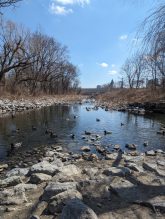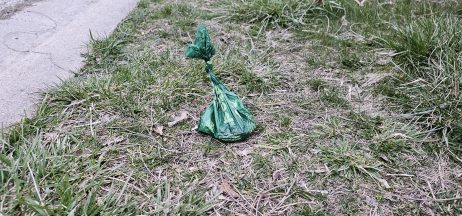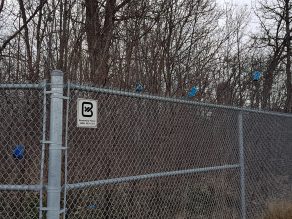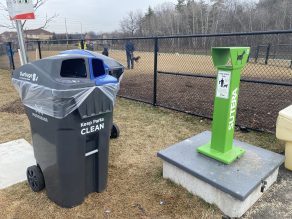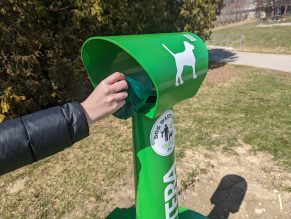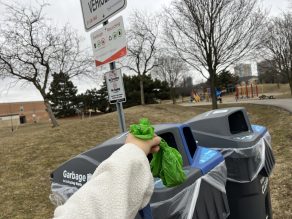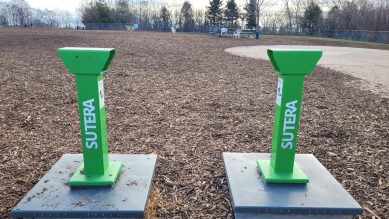Dog waste is still causing quite a stink in Mississauga
Dog waste may seem small but it has a big impact on our environment, contributing to methane gas - a greenhouse gas. Dog waste left on the ground can also contaminate our water sources requiring costly treatment.
Environment | April 4, 2024
While owning a dog has many perks, like better health and companionship, it also means being responsible for cleaning up after your dog. Calls and complaints continue to come through 311, the City of Mississauga’s Customer Service team, about dog owners and dog walkers not picking up after their dogs and leaving dog waste and garbage bags on streets, parks, trails and sidewalks. While it might not seem important, the problem adds up quickly.
If you’re a dog owner, you’re responsible for picking up after your dog outdoors in public spaces. This helps keep our spaces clean, protects our environment and prevents the spread of possible diseases and bacteria.
Drinking water and aquatic wildlife and plants
According to the Canadian Animal Health Institute, the average dog can produce almost 2.5 kilograms (5 pounds) of waste weekly. When it rains, dog waste on the ground soaks into groundwater or flows with rain and meltwater into the City’s stormwater system. This flows to nearby streams, creeks, rivers and ultimately Lake Ontario.
Polluted water sources require more costly water treatment by the Region before it can be used for drinking water. Contaminated water also affects aquatic wildlife and plants and makes beaches and swimming areas unsafe.
Most commercial pet food contains higher levels of nitrogen and phosphorous. Dog waste left on the ground adds nitrogen and phosphorus to the stormwater runoff, which can lead to overgrowth of algae and weeds in Mississauga’s waterways. This can be harmful to aquatic wildlife and ecosystems. When aquatic plants die, the decomposition uses up available oxygen in the water that can harm organisms like fish, frogs and invertebrates like insects, snails and crustaceans.
Where should you dispose of dog waste
Plastic bags filled with dog waste continue to be left in all kinds of places, such as on the ground on trails, sidewalks, streets, fences, trees, forests and bushes at local parks. Dog waste left as litter can attract coyotes and rodents like rats. Rodents tend to eat the undigested nutrients in the feces, while coyotes are attracted to both.
City staff empty about 1,900 waste containers from parks and trails weekly. Sometimes, when containers are full, some owners place their dog waste bags on the ground next to the containers instead of taking it with them, looking for another container or calling 311 to report the full bin. Unfortunately, this approach doesn’t address the problem and only makes it worse.
Bagging your dog’s waste
Always bring dog waste bags with you when walking your dog. All dog waste should be picked up and bagged. While bags don’t have to be compostable or biodegradable, remember to choose a bag that is strong and leakproof so that it won’t tear or break before you can get to the garbage. Collect dog waste in bags, tie bags shut and place them in a nearby waste container or dog waste station.
Dog waste left on the ground takes months to break down, posing health risks to humans and affecting local ecosystems. Dog waste cannot be used as fertilizer. Depending on the health of the specific dog, dog waste can also contain seriously harmful bacteria (e.g. Campylobacter, E. coli), parasites (e.g. Giardia, Roundworm) diseases, viruses, infections (e.g. Salmonella) and a host of others, which can penetrate soil – making people, other dogs or wildlife very sick if exposed to it.
Waste containers and dog waste
Remember to place dog waste in garbage containers or designated dog-waste stations (found in select Parks), or take it home and throw it out with your own garbage.
When you put dog waste in the recycling bin, it contaminates it. That means that valuable recyclable materials will be rejected for recycling and sent to the landfill instead.
If a City waste container is full where you are, hold onto your dog waste and place it in another available waste container and call 311 to report overflowing waste containers.
Designated dog-waste stations (found in select Parks)
As dog ownership increases in Mississauga, diverting dog waste from landfills and prioritizing proper pet-waste disposal is important. The City estimates that Mississauga’s dog population produces 10,705 tonnes (23.6 million lbs) of waste annually. Of that, 7,348 tonnes (16.2 million lbs) of dog waste is disposed of properly and 2,903 tonnes (6.4 million lbs) is left somewhere outdoors.
When dog waste decomposes it contributes to methane gas, which is a greenhouse gas that lasts in the atmosphere for more than 10 years and primarily contributes to ground-level ozone that affects our health (UNEP 2021). Methane produced by dog waste left on the ground to decompose directly impacts local air quality (generation of ground-level ozone) and contributes to greenhouse gas methane emissions. Mississauga’s 7,348 tonnes (16.2 million lbs) of dog waste that is sent to the landfill generates an estimated 11,781 tonnes of carbon dioxide equivalent (based on ECCC’s organic waste GHG calculator).
To help with the amount of dog waste going to landfill and to keep recycling contamination free, the City has installed several dog waste stations. Through these stations, dog waste is stored below ground in a concrete container where it’s cooler and out of direct sunlight, which helps reduce odour. Waste from these stations is collected when the container is full.
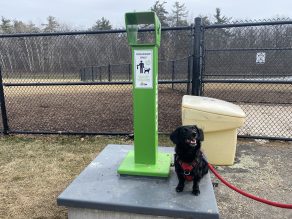
The City’s contractor, Sutera, Inc., empties the containers and transports the contents to a waste-to-energy facility, where the dog waste is transformed into energy and diverted from landfill.
Designated dog-waste stations can be found at 18 parks including:
- Dellwood Park (North side Arbor Rd Entrance) (Ward 1)
- Jack Darling Park (Ward 2)
- Lakeside Park (Ward 2)
- Birchwood Park (Ward 2)
- Thornlodge Park (Ward 2)
- Garnetwood Park Leash Free (Ward 3)
- Shavers Trail (Ward 3)
- Community Commons (Ward 4)
- Mississauga Valleys Park (Ward 4)
- Zonta Meadows Linear (Ward 4)
- River Grove Park Leash Free (Ward 6)
- Linear Park (Burnhamthorpe Rd) (Ward 7)
- Trappers Green (Ward 8)
- Lake Aquitaine (Ward 9)
- Quenippenon Meadows (Ward 9)
- Totoredaca Park (Ward 9)
- Friendship Park (Ward 10)
- Churchill Meadows CC & Mattamy Park Leash Free (Ward 10)
Fines for not picking up dog waste
The City may issue fines for failure to clean up after your dog. You can be fined under the Animal Care & Control By-law and Parks By-law for not picking up after your dog.
If you’d like to request enforcement or clean-up in a specific area, please call 311.
Remember to dispose of your dog’s waste properly if you’re a dog owner or a dog walker. Bring dog waste bags with you on walks and pick up after your dog. Dispose of the waste in designated containers, not in someone else’s yard, on the ground or on public property.
When it comes to maintaining clean and healthy shared spaces, even the smallest actions can make a big difference. This can have a positive impact on the quality of life for everyone, including both dog owners and non-dog owners.
To learn more about the City’s litter efforts, visit mississauga.ca/litter.
Watch the Instagram reel about leash-free zones.
Tags
Media contact
City of Mississauga Media Relations
media@mississauga.ca
905-615-3200, ext. 5232
TTY: 905-896-5151
Get email updates

